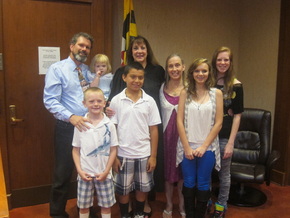Domestic Adoption Through Foster Care or an Adoption Exchange
In Maryland, agency adoptions occur when a domestic adoption placement is arranged by a child placement agency. Child placement agencies are either a local governmental agency, such as the Department of Social Services (DSS), or a private adoption agency. Children that become available for adoption through a public child placement agency such as DSS are often children in foster care.
If a child has been removed from a home by the local Department of Social Services (DSS) due to abuse, neglect or otherwise, the local public child placement agency may place the child in the temporary care and custody of relatives or a foster family that has been home study approved through the public agency. The governmental agency will usually make every effort to reunify the child with their birth parents; however, if the birth parents decide that they do not want to parent or if the court determines that reunification is not in the bests interests of the child, at the request of the public agency, the court will terminate the parental rights of the birth parents.
If a child's plan is changed from reunification to adoption, the relatives or foster family that the child is residing with, may be offered the opportunity to adopt the child. If neither the relatives nor the foster family are interested in or able to adopt the child, the local public child placement agency will attempt to place the child with another relative or local foster family. If the agency is still unable to locate an adoptive family, the local public agency may notify local private adoption agencies and/or place the child on a local, state, or regional adoption exchange. Adoption exchanges, such as AdoptUSKids, feature searchable photolistings of children available for adoption. If you identify a child through an adoption exchange that you are interested in adopting, you must be home study approved before you will be considered. Assuming this is the case, either you or your attorney would contact the social worker or person assigned to the case to determine the child's status at that time (whether parental rights have been terminated or not), the child's social, mental, and medical background, whether the adoption would proceed as an open adoption, and the degree of contact anticipated post-adoption. If you remain interested, the contact person should explain the process to you, as it may differ from jurisdiction to jurisdiction.
When adopting a child through the foster care system in Maryland, prior to termination of parental rights (TPR), the potential adoptive parents and birth parents will have an opportunity through mediation or otherwise to negotiate the terms of a post-adoption contact agreement, which will describe the extent, if any, of contact the birth parents may have with the child after the adoption. Post-adoption contact agreements may include a provision for the exchange of photographs, written updates about the child, or even for supervised visits on a predetermined basis.
Upon the termination of parental rights (TPR), the court will appoint the public agency as guardian of the child, giving it the right to consent to an adoption. Once the government agency obtains guardianship, the prospective adoptive parents must file a Petition for Adoption, with the consent of the agency, to finalize the adoption. After a hearing on the matter, the court will finalize the adoption if it finds that the adoption is in the best interests of the child. The court may also change the name of the child at that time. Adoptive parents will then be able to obtain a new birth certificate for the child and the original birth certificate of the child will be sealed.
If you would like more information about adoptions through foster care in Maryland or through adoption exchanges, please contact Sheri today for a consultation.
If a child has been removed from a home by the local Department of Social Services (DSS) due to abuse, neglect or otherwise, the local public child placement agency may place the child in the temporary care and custody of relatives or a foster family that has been home study approved through the public agency. The governmental agency will usually make every effort to reunify the child with their birth parents; however, if the birth parents decide that they do not want to parent or if the court determines that reunification is not in the bests interests of the child, at the request of the public agency, the court will terminate the parental rights of the birth parents.
If a child's plan is changed from reunification to adoption, the relatives or foster family that the child is residing with, may be offered the opportunity to adopt the child. If neither the relatives nor the foster family are interested in or able to adopt the child, the local public child placement agency will attempt to place the child with another relative or local foster family. If the agency is still unable to locate an adoptive family, the local public agency may notify local private adoption agencies and/or place the child on a local, state, or regional adoption exchange. Adoption exchanges, such as AdoptUSKids, feature searchable photolistings of children available for adoption. If you identify a child through an adoption exchange that you are interested in adopting, you must be home study approved before you will be considered. Assuming this is the case, either you or your attorney would contact the social worker or person assigned to the case to determine the child's status at that time (whether parental rights have been terminated or not), the child's social, mental, and medical background, whether the adoption would proceed as an open adoption, and the degree of contact anticipated post-adoption. If you remain interested, the contact person should explain the process to you, as it may differ from jurisdiction to jurisdiction.
When adopting a child through the foster care system in Maryland, prior to termination of parental rights (TPR), the potential adoptive parents and birth parents will have an opportunity through mediation or otherwise to negotiate the terms of a post-adoption contact agreement, which will describe the extent, if any, of contact the birth parents may have with the child after the adoption. Post-adoption contact agreements may include a provision for the exchange of photographs, written updates about the child, or even for supervised visits on a predetermined basis.
Upon the termination of parental rights (TPR), the court will appoint the public agency as guardian of the child, giving it the right to consent to an adoption. Once the government agency obtains guardianship, the prospective adoptive parents must file a Petition for Adoption, with the consent of the agency, to finalize the adoption. After a hearing on the matter, the court will finalize the adoption if it finds that the adoption is in the best interests of the child. The court may also change the name of the child at that time. Adoptive parents will then be able to obtain a new birth certificate for the child and the original birth certificate of the child will be sealed.
If you would like more information about adoptions through foster care in Maryland or through adoption exchanges, please contact Sheri today for a consultation.


